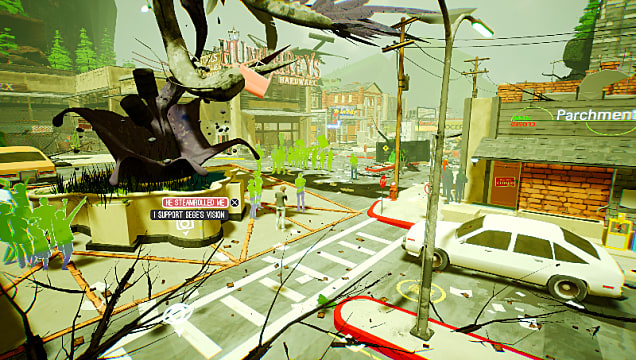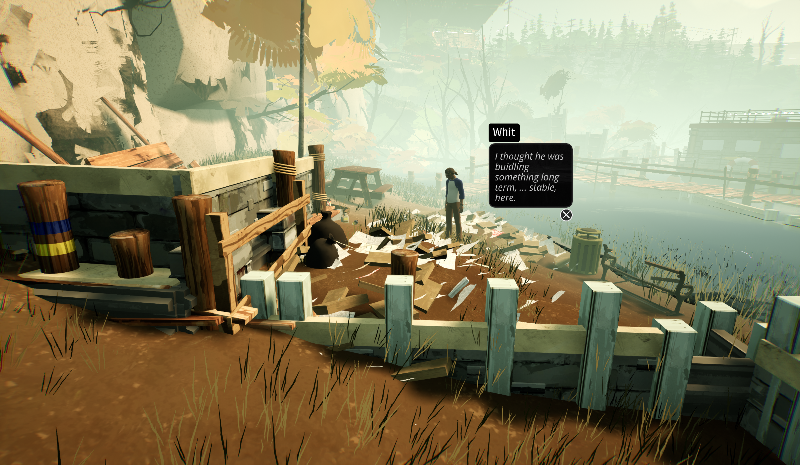Indie games have a way of grappling with normal people and their everyday problems in a way that major big-budget games wouldn’t dare touch.
In turn, we’ve seen many games, over the past decade especially, that have swapped monsters for the mundane, traded heroes versus villains in favor of the middle class versus their mortgages.
Where The Heart Leads is a good example, not just of this trend, but of executing it well. While the game leans heavily on writing that sometimes buckles beneath the weight, on the whole, this is a unique project that seeks to depict both a moment in the lives of everyday people and their entire lives together with all the natural ups and downs that accompany any of us.
Where The Heart Leads Review: A Life Well-Traveled
In Where The Heart Leads, the team behind Batman Arkham Origins Blackgate and ReCore pivots to an entirely new direction, focusing on a boy named Whit and the life he leads through the decades. It’s hard to find a point of reference in its own medium, but look elsewhere and you may agree this ambitious project is not unlike Linklater’s Boyhood.
The premise was enough to pull me into Whit’s story, but it’s the impressive branching paths laid out before players, sometimes seen, other times unseen, that really kept me invested.
As a young kid, Whit has parents who make him work when he wants to play. He’s got a creative but troublemaking older brother. He’s even got a girl next door with whom he’s falling in love. Where The Heart Leads plays off of familiar tropes but slowly unravels them and reshapes them across roughly 10 hours.

Players will push Whit down a new path with each choice made, and the game does surprisingly well in accounting for your past decisions. Often the game calls back to them confidently in dialogue, as though Armature is certain its narrative navigational systems are properly calibrated.
Where The Heart Leads is probably best considered a visual novel, despite the fact that the game allows players to move through its scenes — sometimes even sizeable hubs like towns — rather freely. Players will most often have a few things to do and they can generally do them in any order, eventually advancing the plot once all story beats have been performed.
More so, it’s like a novel in that players will be doing a ton of reading. Without voice acting, it’s on you to keep up with the hundreds — if not thousands — of dialogue lines in the game. Armature smartly allows for players to open an overlay and catch up with the last several minutes of dialogue as needed.
Players can zoom in and out of any scene to a certain extent, but sometimes even the closest view of a scene feels too far. Thankfully, a pre-launch patch improved the text size and should now hopefully satisfy most or all players’ accessibility needs. Still, with music that loops a bit too often in several long scenes and animations that come across as wooden at times, it’s not always as immersive as one would want for a game so intimately portraying a single family’s shared life together.
But this remains a story-first experience, and in that regard, it performs much better, albeit still imperfectly. By the end of a single playthrough, players will only see a select few cutscenes out of the many possible, based on their choices through the game. It is impressive for a small project like this.
The story any player will get on their own adventure is likely still to be well worth its runtime. Characters get fleshed out very well, and investment in the lives of your kids, parents, siblings, and so on comes naturally thanks to the extended time spent with everyone.
Choices are rarely easy and they satisfyingly creep into more standard chatter too. It’s not just when the game pauses and dramatically informs you of a big choice to make that will affect your ending. The details matter, and I was heartened to see those smaller beats pay off in bigger ways as Whit’s life went on.
We don’t usually know when we’re making a decision that will forever change our lives. Sometimes we can be reasonably sure, like when I moved across the country in my own life. But other times, these monumental chaos theory-like actions begin with something unforeseen. In my example, I’d have never moved to the west coast if not for finding my favorite band which would one day lead me to my future wife who lived in Portland.

Where The Heart Leads is at its absolute best when it captures this same fatelessness. Sometimes the choices we make feel like serendipity, other times they lead to tragedy or any number of other outcomes. Where The Heart Leads runs the gamut on life’s perpetually forking paths, and whatever road you choose, it will feel earned by the time you hit the credits.
I do wish the story was better paced. Some scenes play out in one location for over an hour, while others can unfold in the span of a few seconds, moving from scene to scene almost like a montage. It’s a bit uneven in that way throughout, and likely no matter who your version of Whit becomes, but the game’s toying with metaphysical and magically real concepts at least means those pacing issues are offset by some visually striking scenes, even if they come and go in a flash at times.
Where the Heart Leads Review — The Bottom Line

Pros
- A well-told story with seemingly countless branching paths
- Characters who are well-written across the board
- A novel approach to video game story, focusing on one family for their entire lives
Cons
- Some persistent pacing issues
- Presentation problems such as wooden animations and repetitive music
Where The Heart Leads feels like a very niche experiment that will satisfy its intended audience and deter most others with its walls of text and barely-there gameplay mechanics.
While far from flawless, the story’s endlessly branching narrative stays true to the characters you’ve come to know. As you shape your own version of Whit, you in turn shape those around you, leading to one of several dozen endings.
Like our own lives, you can’t see where it’s going even with the best intentions, but across decades of Whit’s life, you’ll appreciate the time you spend in his shoes.
[Note: Armature Studio provided a copy of Where the Heart Leads for the purpose of this review.]








Published: Jul 6, 2021 05:41 pm